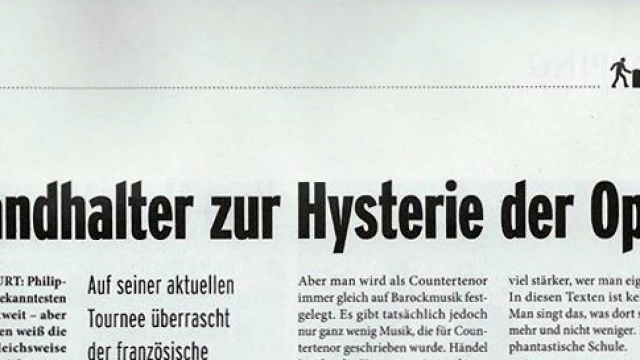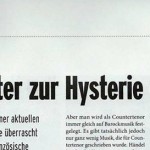“Abstandhalter zur Hysterie der Oper”
Journal Frankfurt, February 2015
The following is not a professional translation; no profit is being made, no infringement of copyright is intended.
On his current tour, the French countertenor Philippe Jaroussky surprises his audience with fin de siècle songs.
Interview: Christian Rupp
JOURNAL FRANKFURT: Philippe, you are one of the world’s most famous countertenors – yet relatively little about your private life is known to the public. Don’t you like to talk about it?
PHILIPPE JAROUSSKY: I don’t talk about it that often because, really, the focus is on my art.But you’re a star …
Star? Well, I lead a normal life; I have been together with my partner for eight years now. All in all, it is a very settled life.You have put your cards on the table about him right from the beginning…
Of course. When I started my career, I had to decide. So, right from the start, I said that I had a partner. Then there’s no fuss anymore. I’m not a pop singer who has to hide that for twenty years because otherwise he would lose the market section of all the teenage girls.Another known fact is that you like to travel a lot. How frequently do people recognize you on your travels?
It depends. Sometimes they do, sometimes they don’t. When I walk the street in Paris, of course, someone will always recognize me. But people react completely different than they would if I were a pop star. Because, primarily, it is in Händel, Vivaldi, Bach that they are interested– not in me. I don’t create songs, I don’t create a look, I am not a brand. That’s why people are much more respectful. Classical music stars are in a very comfortable position in this regard.So you are enjoying your life in Paris?
Yes, I can absolutely enjoy my life in Paris. I can go out wherever I want to. I don’t have to be protected by bodyguards. I am very happy with it. Moreover, I have the great luck to record what I want to, sing what I want to, go where I want to, take a time out whenever I want to. And I won’t get into any trouble over it – that’s cool.So let’s talk about your music: So far, you have dedicated your albums to Vivaldi, Händel, Purcell, Pergolesi, and Porpora. Now, suddenly, you are touring with music from the French fin de siècle. Does this mean goodbye to Baroque music?
No, I’m not leaving it behind! Even though this project was a surprise for many. When I started singing, approximately 15 years ago, I started with learning Vivaldi, Bach, and Händel, sure. But I have worked on Debussy and Fauré with my teacher as well – she is a great specialist for that repertoire. In one of my first courses I sang songs by Fauré for example. Nonetheless, as a countertenor, one is immediately defined to Baroque music. Yet, in fact, there is very little music that was originally written for a countertenor. Händel has written for a castrato voice, not for a countertenor voice. That’s a huge difference!A new repertoire always opens up new horizons. How was that for you?
Of course, I like operatic arias. But for my voice, many parts are simply too exaggerated, too theatrical; everything is too big, too much suffering, too much screaming, you have to die with great ado – in contrast, in French poetry, feelings are much more pastel-like, more refined, sweeter. When I return to opera afterwards, I feel much stronger; I can convey feelings much more freely. This might be the exact reason why many singers choose chansons or songs if they need a break and some distance to this hysterical world of opera.Fauré, Debussy or Hahn, however, didn’t write for your voice range … How does this work?
Most of the songs are written for singers. Period! The composers didn’t have a soprano, mezzo, or baritone in mind. I am a singer, and therefore I can sing this repertoire. As an artist, it is really all about following your instinct – and my instinct tells me that I enjoy this kind of music. I feel so comfortable when I sing it. And that’s the point. I don’t want to only keep singing the works of three composers all throughout my life.But instead?
In the years to come, I am definitely going to go for a completely different repertoire. Giving a recital accompanied by a piano in front of an audience suddenly opens up a whole lot of possibilities to reflect upon yourself. You realize much more intensely who you really are. There’s no drama in these words. You sing what is written, no more, no less. That is a great education.… and to which effect?
We opera singers tend to dramatize everything, even if there’s no drama in it to begin with. We want to be expressive, but are unsure how to be exactly. There are singers who sing as if they had just lost their entire family. Being faced with these poems, one becomes very demure with the vocal effects and the possibilities that sometimes work with opera – because here, they suddenly don’t work anymore. You realize that you kill off the poetry of the lyrics if you put too much into your voice. That is pretty interesting.Will we hear you giving the great song cycles by Schumann and Schubert a go as well then, anytime soon?
I’ve actually tried it before. A couple of Schubert songs, or even from the cycle “Dichterliebe” by Schumann. That was very interesting. But even though I can pronounce the language reasonably well, it is incredibly difficult to really capture the spirit of these pieces. I just feel more comfortable with French songs at the moment. Never say never, but it is just too early for me to capture the flavour and finesse of these lyrics. I’ll probably start with Bach when it comes to German …And what about Schubert?
In ten years’ time, I will give a Schumann-Schubert recital. Promised.
via Journal Frankfurt (printed edition only)


